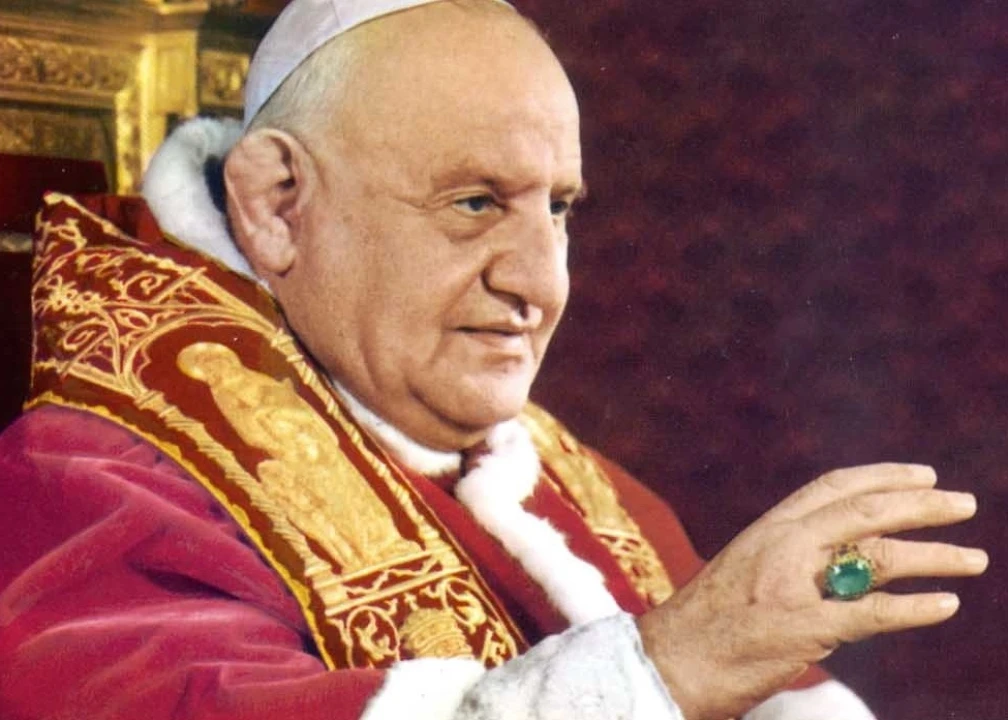Nicknamed "The Good Pope", John XXIII, born Angelo Giuseppe Roncalli, in a pontificate of just 5 years managed to undermine the former patterns of the Catholic Church and its power in Rome, giving the figure of the Pope a feature of familiarity. The Pope had become, as he liked to say, "a brother who speaks to the other brothers, become a father for the will of the Lord".
Born on November 25, 1881 in Sotto il Monte, a village in the province of Bergamo, Angelo Roncalli has the opportunity to study to become a priest with the economic help of an uncle, because he was originally coming from a family of humble origins.
From the beginning, his ecclesiastical life is characterized by diplomatic missions, to which the personality of Angelo Roncalli, ductile and affable, is particularly suitable. Already in 1925, Pope Pius XI sends Roncalli in Bulgaria. His mission was supposed to last a few months, but Roncalli ended staying there for about 10 years, moving into deeper contact with the Bulgarian people and with the Orthodox Church and achieving important results in the ecclesiastical field. The future Pope will be able to solve some serious conflicts between the local dioceses and will start diplomatic relations with the Bulgarian government for a full recognition of the Holy See in Sofia.
In 1934 he is in Turkey, where he tightens a special relationship with the German Ambassador von Papen: this friendly relationship will allow him to save many Jewish Germans children, arrived in Turkey on a ship and ready to be sent back to Germany, where they going to face a certain death.
In 1944, at the behest of Pope Pius XII, Roncalli becomes Apostolic Nuncio in Paris. The many diplomatic successes that will follow on French soil will allow him to achieve the Great Cross of the Legion d'Honneur from the hands of the French President Vincent Auriol in 1958.
In 1953 he begins the ecclesiastical career that Angelo Roncalli had always dreamed of. Roncalli is appointed Patriarch of Venice, and begins to live in close contact with the faithful observants, avoiding all barriers, living a simple life and being available to anyone with no problems, convinced as he was that "anyone could need to go to confession" and that he could not "reject the secrets of a lost soul”.
Among the general surprise, on October 28, 1958, Angelo Roncalli is elected Pope. At first the common thought about this was him being a transition Pope, harmless and accommodating. But that thought soon proved to be wrong. Pope John immediately becomes a surprising and unpredictable figure for the rigid catholic patterns. His "unscheduled" events become famous all around the world. His affability, the contact with the faithful, his engaging anecdotes mean that Pope John XXIII enters the collective memory as a man of love even before as the Vicar of Christ.
Famous is the meeting with the Gesù Bambino hospital's children in Rome, during his first
Christmas as a Pope. Many of the children will exchange the Pope for Santa Claus. Extraordinarily exciting is also his visit to the Regina Coeli prison, during which Pope John XXIII turns to the inmates saying "You couldn’t come to me ... so I came to you. I put my eyes into yours. I have put my heart close to your hearts".
During the meeting with Jacqueline Kennedy, Pope John XXIII abandons the formal expressions of greeting to the First Lady that had been suggested to him, turning to her with a familiar "Madame Jaqueline!".
One of the great merits of Pope John XXIII is the call of the Second Vatican Council, organized in a few months for the general amazement and the opposition of the conservative part of the curia.
And yet, during the Cuban Missile Crisis in the October of 1962, the relations between Kennedy and Khrushchev begin to relax following the intervention of Pope John XXIII, who warmly invites the two leaders "to continue to negotiate" and "not to remain indifferent to the cry of humanity”, "to avoid to the world the horrors of war".
His encyclical, Pacem in Terris, remains a fundamental text on both the theological and the historical level. The work of Pope John XXIII reconfigures peace as a result of the individual human consciousness, the realization of his freedom, and the rights and obligations arising from them, as extraordinary individual being, who cannot be annihilated in front of the systems, whether capitalist or socialist.
On June 3, 1963, Pope John XXIII dies, after a long fought against a stomach cancer. "Why are you crying? This is a time of joy. A moment of glory" were his last words.
On April 27, 2014, Pope Francis has celebrated the canonization of Pope John XXIII, simultaneously with that of Pope John Paul II. A final act that recognizes the sanctity of an extraordinary man, whose humanity transcends the boundaries of the Catholic Church, to be recognized by all as an example of unconditional love towards others.




